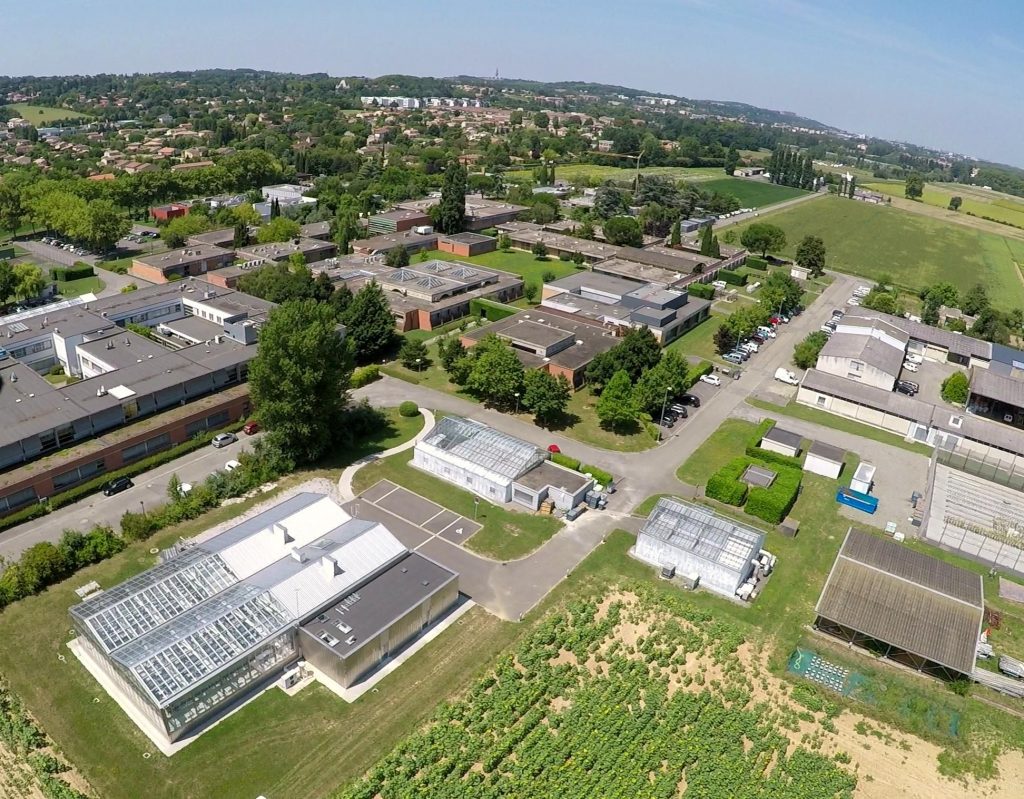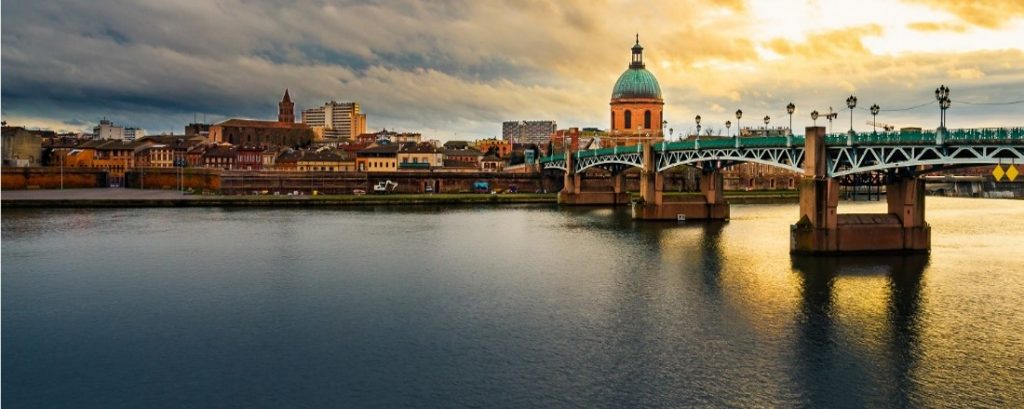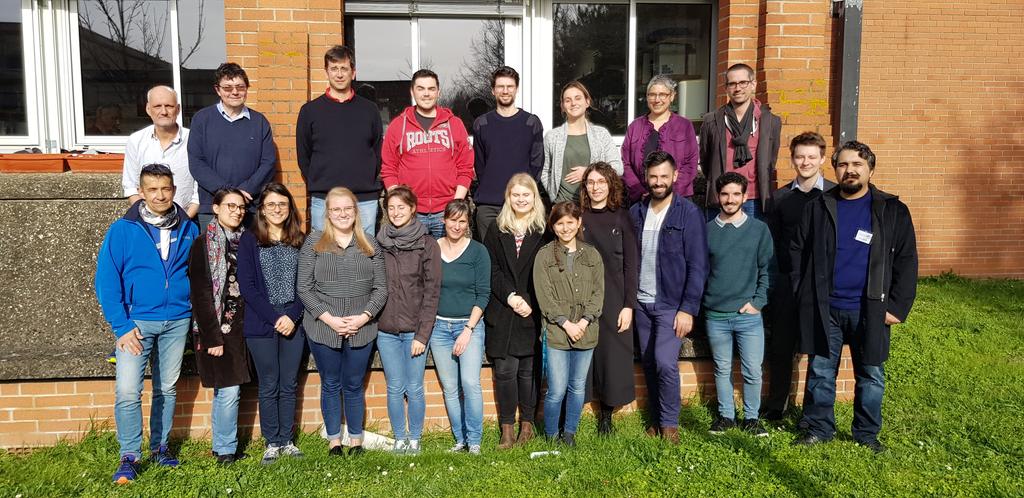Training School 2020 (Castanet-Tolosan)

Training School on “Tracking bacteria in planta“
The 3rd Training School of the EuroXanth COST Action on “Tracking bacteria in planta” took place in Castanet-Tolosan, France, from March 9 to 13, 2020.
This Training School addressed different aspects of in planta analyses (strategies and methods) to study Xanthomonadaceae-plant interactions during the infection process. The Training School started with a presentation of pathosystems differing by their ecology and mechanisms of interactions (Xanthomonas translucens, Xanthomonas campestris, Xylella fastidiosa). Inoculation methods and their impact on patho-assay outcomes have been discussed. Methods of in planta infection monitoring using high-resolution microscopy, flow cytometry, and more classical bacterial population estimation (in planta growth) were presented and practical courses were held on the Cell Biology Platform (Toulouse, France).
OMICs have revolutionized the field of molecular plant pathology by increasing the number of available genome sequences and leading to development of new methods for in planta analysis of bacterias’ lifestyle. This Training School addressed as well in planta transcriptomic analyses presenting different protocols, different methods of biostatistical analysis and their impacts on outcomes. Omics methods for in planta bacterial fitness were also addressed, including different TnSeq methods and associated biostatistics. Benefits of these methods have been discussed.
The Trainers and Trainees also visited the INRA campus and its various facilities (Phenotyping: TPMP; Microscopy: FRAIB; Sequencing: GetPlage).
At a glance:
- Date: March 9-13, 2020.
- Venue: Laboratoire des Interactions Plantes Micro-organismes (LIPM), INRA campus, 24 chemin de Borde Rouge – Auzeville, CS 52627, 31326 Castanet-Tolosan cedex, France.
- Organisers: Dr. Alice Boulanger & Dr. Laurent Noël, LIPM, Castanet-Tolosan, France.
- Contact details: alice.boulanger@inra.fr; laurent.noel@inra.fr.
- Trainees: Up to 12 persons.
- Targeted trainee audience: Young scientists from PhD students to postdoctoral fellows with basic level in molecular biology and microbiology.
- Trainee grant: The financial support from COST CA16107 is a fixed contribution of up to 1000 € for max. 12 persons to cover accommodation costs and travel expenses. Trainees grants do not necessarily cover all expenses related to attending the training school.
- Other participants: Trainees not paid by COST CA16107 are welcome to participate; the fee for participation constitutes 500 €.
- Application procedure: Submission through email (alice.boulanger@inra.fr, with Ralf.Koebnik@ird.fr in CC) of the following documents: i) intent of interest, ii) recommendation letter, and iii) short curriculum vitae (2 pages max.).
- Requirement: The trainees will require to bring along a laptop (with sufficient admin rights allowing to install freeware).
-
Deadline for application: October 31, 2019.
- Announcement of eligible trainees: November 30, 2019.
Trainers:
- Pathosystems: Prof. Claude Bragard (Professor at Université catholique de Louvain, Belgium) and Dr. Laurent Noël (LIPM, INRA, Toulouse, France)
- Microscopy and infection monitoring: Prof. Claude Bragard (Université catholique de Louvain, Belgium), Dr. Jonathan M. Jacobs (Assistant Professor, Plant Pathology, Ohio State University, Columbus, USA) and Cécile Pouzet (Head of microscopy facility, FRAIB, Toulouse, France)
- Transcriptomics: Dr. Richard Berthomé (LIPM, INRA, Toulouse, France)
- Biostatistics: Dr. Marie-Françoise Jardinaud (Lecturer, ENSAT, Toulouse, France)
- TnSeq: Dr. Jennifer Lewis (Adjunct Assistant Professor at Berkeley University of California, USA) and Dr. Erwan Gueguen (Lecturer, Claude Bernard University, Lyon, France)
- Flow cytometry: Dr. Gérald Grégorie (CNRS, Marseille, France, Head of PRECYM facility) and Dr. Marta Marchetti (LIPM, INRA, Toulouse, France)
- Competition assays: Julien Luneau (PhD student, LIPM, INRA, Toulouse, France) and Dr. Alice Boulanger (Lecturer, Paul Sabatier University, Toulouse, France)
Scientific Committee:
- Ralf Koebnik (EuroXanth Chair)
- Vittoria Catara (Vice Chair)
- Jöel Pothier (WG2 Leader)
- Eran Bosis (WG2 Vice Leader)
- Laurent Noël (Local organiser)
- Alice Boulanger (Local organiser, MC Member)
- Aitana Ares Yebra (Portugal, ECI & ITC)
- Massimiliano Morelli (Italy, Xylella, ECI)
Venue:
INRA Campus
Laboratoire des Interactions Plantes Micro-organismes (LIPM)
24 chemin de Borde Rouge – Auzeville
CS 52627
31326 Castanet Tolosan cedex
FRANCE

About the LIPM and INRA research center:
INRA is the largest agricultural research institute in Europe, with over 8,000 researchers, engineers, and technicians, and is the second largest producer of agricultural science publications. INRA contributes to development of knowledge and innovation in the fields of food, agriculture, and the environment. INRA carries out its work across 13 scientific divisions through a research network that is unique in Europe, with more than 200 research units and 50 experimental units located in 17 research centers throughout France. Its aim is to contribute internationally to the development of healthy, high-quality food, competitive and sustainable agriculture, and a protected and valued environment. Among its 17 research centers, the one localized in Toulouse is composed of 18 laboratories with one dedicated to the study of plant-microbe interactions, the Laboratory of Plant-Microbe Interactions (LIPM). LIPM was created in 1981 and is a joint INRA-CNRS Research Unit, focusing its research on the interactions between plants and either symbiotic or pathogenic microbes, coordinating studies on both plant and microbial partners. The LIPM addresses scientific questions that have a major impact on agriculture and the environment. In the long-term, our research aims to provide new concepts and tools in the struggle against bio-aggressors.
This unit is part of a Research Federation (FR 3450, Agrobiosciences, Interactions, Biodiversity), which brings together the main plant biology and ecology laboratories in the Toulouse area.
The LIPM is also a key component of the LabEx (Laboratory of Excellence) TULIP (Toward a unified theory of biotic interactions: role of environmental perturbations) aiming at establishing high quality research and education in the field of ecology and plant biology in the French Midi-Pyrénées region.

About Toulouse:
The INRA center is localized close to Toulouse. Toulouse is the fourth most populated city in France. Toulouse is nicknamed the “pink city” because of the color of the traditional local construction material, the terracotta brick. The development of the “violet” culture in the nineteenth century makes it an emblem of the city and earned it the nickname “city of violets”. Relating Toulouse to Sète, the “Canal du Midi” has been a UNESCO World Heritage Site since 1996. The Basilica of Saint-Sernin, the largest Romanesque building in Europe, has also been listed since 1998 under the Saint-Jacques roads Compostela.
Toulouse is also the European capital of the aeronautics and space industry with the sites of Airbus and its parent company Airbus Group. It is a dynamic city with more than 100,000 students. The emblematic sport of Toulouse is rugby, its club Stade Toulousain holding the richest track record on the national level as well as on the continental level, with 20 titles of French champion and four titles of European champion. Cassoulet, sausage and violet are the emblematic specialties of Toulouse gastronomy.
Accomodation:
The INRA Center does not have accommodations. Trainees are thus requested to perform the booking of their accommodation. Recommendations for accommodation will be transmit to selected trainee.
Miscellaneous:
- Airport or train station to INRA Center: Toulouse Airport is connected to Toulouse by either Tramway line T2 (1.70 euros) or Airport shuttle (8 euros). The T2 line will bring you to Metro station “Palais de Justice”. From there you can take Subway line B in direction to “Ramonville”. At the terminus station “Ramonville” you have to take the bus line L6 to the stop “INRA”.
Using Airport Shuttle, you should take the Stop at “Compans–Caffarelli”. From there you can take the Subway line B in direction of “Ramonville”.
If you arrive at Marengo SNCF Train Station, you can take the Subway line A in direction to “Basso Cambo”, stop at station “Jean Jaures” and take the line B direction “Ramonville” until the terminus.
You can purchase transport ticket here and have a look at the map. - Citizens from Western European countries need a valid identity card or a passport that did not expire more than five years ago. Nationals of other countries need a valid passport. For stays of less than 90 days (3 months), the VISA to be requested is a short-stay VISA called “Schengen VISA“.
- French is the official language spoken. English can generally be spoken as well.
- The currency is the Euro (€)
- Electricity in France runs on a 220-volt, 50-hertz AC current. France also uses a Type E plug (round pin and receptacle with male grounding pin). If you bring electrical appliances, you might need a plug adapter.
- Telephone code: (+33)
As the third EuroXanth event bringing together trainers and trainees of COST partner institutions working on Xanthomonas and Xylella, this event was a great success of this COST Action. The success is not only due to the high-quality presentations, demonstrations and hands-on activities, but it is also linked to the lively exchange among all participants in a very friendly and open-minded atmosphere. There was ample of time for discussions, which were not restricted to the focus of the Training School and which will certainly help all of the participants in their future career.

The EuroXanth COST Action would like to thank all the organisers, trainers and trainees for their commitment to this event.
